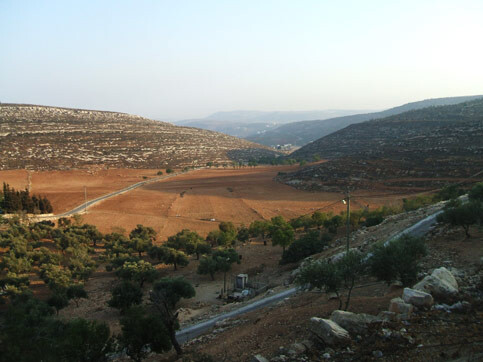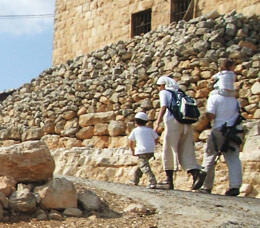
Yanoun village.
I consider myself an immensely privileged person. While my friends back home spend the rainy British afternoons indoors, fretting about global financial meltdown and wondering if there’s any chance of sunshine this year, I sit in the shade of an olive tree on a hillside overlooking a rust-red Mediterranean valley, and ponder.
Compared to London, life in the northern West Bank village of Yanoun moves slowly. A boy of seven or eight stands near me with a plastic pipe and a bottle of detergent, blowing bubbles into the breeze. Lizards dart among the rocks and sparrows scrap noisily in the cracks of a barn wall. The only other sounds are cries from olive pickers in the valley, bleats of sheep and once every half an hour or so, the revs of a distant tractor. For Yanounis, the terms “credit crunch” and “financial crisis” are, like Tony Blair and the Icelandic Krona, largely irrelevant.
But Yanoun, like many West Bank Palestinian villages, is no stranger to crisis. Six years ago, armed civilians from the nearby illegal Israeli settlement of Itamar forced the entire population to evacuate. They smashed up property, destroyed the village’s electricity generator, mutilated sheep and cut down hundreds of ancient olive trees. Eventually, the village residents, fearing for their children, packed their bags and left. They only came back when Israeli and international peace organizations established a permanent base in the village. Since then, “foreigners” have been a constant presence.
The children playing in the dusty yard of the house below my olive tree know that they are surrounded by foes. The tops of the surrounding hills, which used to belong to the village but have been confiscated for use by the settlement, are scattered with watchtowers, mobile trailers and chicken sheds. Groups of settlers, often teenagers, regularly come through the village accompanied by dogs and carrying M-16 machine guns.
I visited Youssef Ahmad, the head of Yanoun’s village council, in his modest breezeblock house a few weeks ago, one evening during Ramadan. We sat and drank tiny cups of thick black coffee as he told me the story of his village. Youssef’s wife sat calmly in a corner with her embroidery, while their six children ran through the house, playing games. It was a scene of domestic peace. But for Youssef and his community, such tranquility is always fragile.

Armed Israeli settlers walk through Yanoun.
The situation rapidly deteriorated as more settlers moved into the illegal outpost on the top of a hill overlooking Yanoun.
“They began besieging us,” said Youssef, as he put his coffee cup down and stroked the thick black stubble on his chin. “They would come down among the houses here, carrying M16 machine guns. We started to live as if we were under curfew; we were scared to leave our houses. One time, a settler rode a horse past our house and pointed his gun through the window at the children. Of course, the children were terrified.”
In 2002, the harassment reached its climax. A Palestinian gunman, with no connection to Yanoun, killed five settlers in Itamar and the settlers responded by unleashing a torrent of violence. They shot a Palestinian dead in the fields around Yanoun, burst into houses with weapons, beat men with their rifle butts and gouged out one person’s eye. They cut down around 1,000 olive trees and killed dozens of sheep. The villagers were forced to leave for the nearby town of Aqraba, the first time since 1967 that the entire population of a Palestinian village had been forcibly evicted.
In order for the villagers to return, a permanent international presence was established in Yanoun by Israeli and international peace groups. In 2004, the Ecumenical Accompaniment Programme in Palestine and Israel officially took over this responsibility, and teams of “Ecumenical Accompaniers” have lived in the village ever since.
“Harassment by the settlers has decreased by maybe 80 or 90 percent,” says Youssef. “The reason is that foreigners are in the village. The presence in Yanoun of people from peace groups is what has changed the situation.”
Violence by settlers is increasing across the West Bank. A recent UN report recorded almost as many attacks on Palestinians by Israeli civilians in the first half of 2008 as in the whole of 2007. These included assault, firearms offenses, theft, arson and damage to property.
In mid-September, over 200 vigilantes from the settlement of Yitzhar invaded the Palestinian village of Asira al-Qibliyyah with guns and slingshots, in response to the stabbing of a Jewish boy from the settlement. They marched through the streets, shooting in the air, smashing windows and overturning a car. Local Palestinians claimed that the Israeli authorities have done nothing to protect them from such violence.
“Whatever the settlers want, the army does it,” claims one resident of Yanoun. “Last year, the [Israeli army] set limits within which we could pick our olives. We said ‘okay,’ and got on with the work. But the settlers came and told the army to move the limits back, and they did. It meant that we couldn’t harvest all of our trees.”
At the beginning of this year’s olive harvest, the Israeli high court ordered the army and the police to protect Palestinian farmers. This ruling was the direct result of pressure from human rights groups which claim that in previous years, Israeli civilians have engaged in acts of “assault, threats, theft and sabotage. In general, the security forces and the police have stood by and not prevented this harassment, and in certain cases even use them to justify stopping the harvest at the site,” as stated by the Israeli human rights organization, Yesh Din.
The Israeli army claims that it does not have the resources to deal with settler hooliganism. An Israeli army official recently told the Israeli daily newspaper Haaretz that “In the past, only a few dozen individuals took part in such activity. Today that number has grown into the hundreds. That’s a very significant change.”
“The police is weak and it needs to increase its manpower involved in these types of investigations in the West Bank,” another officer said. “The [Israeli army] cannot stop this on its own.” The onus remains on the Israeli authorities to demonstrate that they will seriously and consistently tackle violence by their citizens in the West Bank. In the past, even Israel’s Attorney General has complained about “a lack of appropriate law enforcement” against Israelis in the Occupied Palestinian Territories. Whether that will change largely depends on the political will, or lack thereof, of [hatever Israeli government is elected.
Yet, for the residents of Yanoun, even such crucial questions seem rather distant. Thankfully, so far today, the village has had no unwelcome visitors. My young companion still has half a bottle of detergent to blow bubbles with. The sheep are contentedly mowing the fields below, and the barn-wall sparrows are still engaged in their endless, harmless battles. Hopefully it will remain so. This part of the world, for all the bad news we read about it, is truly beautiful when nothing much happens.
All images by Paul Adrian Raymond.
Paul Adrian Raymond is working in Yanoun, near Nablus, for the World Council of Churches’ EAPPI programme (www.eappi.org), which provides protective international presence to Palestinians and campaigns for a just resolution to the Israeli-Palestinian conflict through the application of international law. He recently graduated in Arabic and Middle Eastern Studies from Leeds University in the UK.
Related Links



